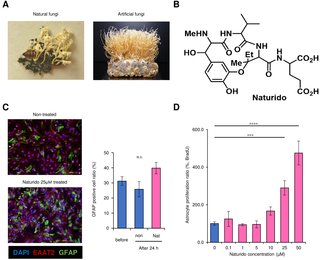
Iwate University: Contribution of’Cacerpillar fungus’ substance: dementia and Alzheimer’s disease
Iwate University: Biococoon Research Institute
Mushrooms that parasitize the pupae of the silk moth, “Touchikaso”
It was found that a substance called “Naturido” contributes to the improvement of dementia and Alzheimer’s disease.
The venture company “Biococoon Research Institute” (Morioka City) from Iwate University announced.
Treatment for brain disease:
In the future, “it can be used for the treatment of brain diseases such as dementia, Parkinson’s disease and schizophrenia.”
In addition to Iwate University
Osaka City University,
Kyushu University,
Conducted in collaboration with Iwate Medical University.
The research results were published in the American scientific journal “PLOS ONE” (electronic version) on January 28 (Japan time).
Spirogyra Cordyceps:
In 2010, the Biococoon Institute gave an extract from the silk moth Cordyceps sinensis to aged mice.
As a result, he announced that “the scar on the hippocampus of the brain, which controls memory, has been repaired.”
Evolved research with confidence that the silk moth Cordyceps sinensis contains the causative substance.
In 2013, we identified Naturido.
Naturido:
After that, the research was carried out for about 6 years.
“Naturido has the effect of promoting the growth of nerve cells,” he found.
Yomiuri Shimbun Online
https://www.yomiuri.co.jp/science/20210203-OYT1T50037/
A novel cyclic peptide (Naturido) modulates glia–neuron interactions in vitro and reverses ageing-related deficits in senescence-accelerated mice
The use of agents that target both glia and neurons may represent a new strategy for the treatment of ageing disorders.
Here, we confirmed the presence of the novel cyclic peptide Naturido
that originates from a medicinal fungus (Isaria japonica) grown on domestic silkworm (Bombyx mori).
We found that
Naturido significantly enhanced astrocyte proliferation and activated the single copy gene encoding the neuropeptide VGF and the neuron-derived NGF gene.
The addition of the peptide to the culture medium of primary hippocampal neurons increased dendrite length, dendrite number and axon length.
Furthermore, the addition of the peptide to primary microglial cultures
shifted CGA-activated microglia towards anti-inflammatory and neuroprotective phenotypes.
These findings of in vitro glia–neuron interactions led us to evaluate the effects of oral administration of the peptide on brain function and hair ageing in senescence-accelerated mice (SAMP8).
In vivo analyses revealed that spatial learning ability and hair quality
were improved in Naturido-treated mice compared with untreated mice, to the same level observed in the normal ageing control (SAMR1).
These data suggest that
Naturido may be a promising glia–neuron modulator for the treatment of not only senescence, but also Alzheimer’s disease and other neurodegenerative diseases.
https://journals.plos.org/plosone/article?id=10.1371/journal.pone.0245235#abstract